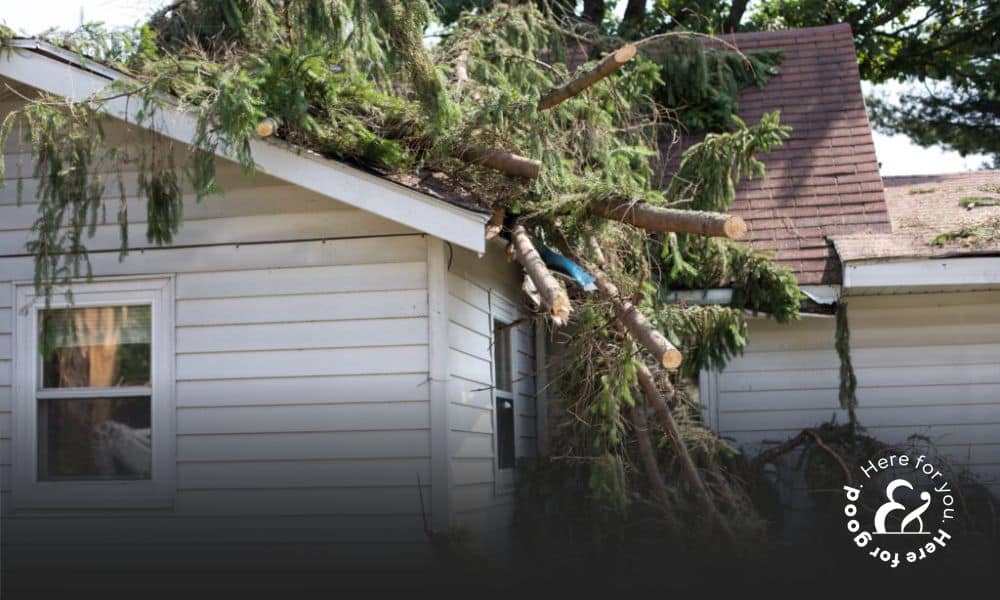Table of Contents
With Hurricane Milton barrelling into Florida’s Gulf Coast so soon after Hurricane Helene, Florida homeowners are facing a complex situation when it comes to insurance claims. If your property sustained damage from both storms, navigating the insurance process could be more challenging than usual, and some unique issues may arise that require legal assistance.
We asked first party insurance claims attorney Andreas Study what Florida homeowners should keep in mind when filing insurance claims after the two hurricanes.
Taking Action To Protect Your Home
It’s common for homeowners’ insurance policies to require that homeowners take reasonable steps to protect their property, a clause known as the duty to mitigate damages. “If your home is already damaged,” says Andreas, “you must act within reason to protect your home from further harm.” This means that whether a second hurricane was coming or not, you would be responsible for doing what you can to protect your property from getting damaged more.
What Are Reasonable Steps To Protect My Home?
Reasonable steps can include covering damaged sections of the roof with tarps, boarding up broken windows, and using sandbags to prevent flooding from worsening. Additionally, if the home is uninhabitable, moving belongings to a dry, safe place or arranging for temporary repairs to prevent mold growth are also considered reasonable measures.
Failing to do so can result in the insurer reducing or denying the claim, arguing that the homeowner’s negligence led to additional preventable damage. Keep receipts for any temporary repairs, as these costs may be reimbursed by your insurance company as part of your claim.
The Insurance Company May Try To Apply Multiple Deductibles
In Florida, homeowners’ insurance policies typically include a special hurricane deductible, which is separate and often higher than the standard deductible. This deductible applies once per calendar year. However, if you sustained damage from Hurricane Helene, you may have already met your hurricane deductible for the year. With Hurricane Milton striking so soon after, this raises questions about whether your deductible needs to be met again or if you can file a new claim under the same deductible.
Carefully Review Your Insurance Policy
Insurance companies may attempt to apply a second deductible for damage caused by Milton, especially if you haven’t yet filed a claim for Helene. It’s important to review your policy carefully and consult with a lawyer if there is any ambiguity about how your hurricane deductible applies in this situation. Insurers are often incentivized to minimize payouts, so having legal representation can help ensure that they apply the deductible correctly and that you are not unfairly charged twice.



If you were injured in an accident due to someone else’s negligence, Farah & Farah is here for you. We’ve relentlessly fought for the right to compensation for our clients and their families since 1979.
Insurance Companies May Blame the First Storm
One of the most challenging aspects of back-to-back hurricanes is distinguishing which damage was caused by which storm. Insurance adjusters will often try to attribute damage to the first storm—Hurricane Helene in this case—to avoid paying out on claims for Hurricane Milton. This can be especially problematic if the second storm causes additional damage to property that was already compromised by the first storm.
Document the Damage From Both Hurricanes
Adjusters may argue that certain damage was pre-existing from Hurricane Helene, making it harder to claim for the additional damage caused by Hurricane Milton. This is where detailed documentation becomes critical. Homeowners should have photos, videos, and records of any repairs or damage assessments from Helene before Milton hits. If this documentation is unclear, or if the insurer is disputing your claims, an attorney can help ensure that both storms are accounted for properly and that you aren’t shortchanged due to the insurer trying to minimize liability.
Insurance Claims Processes May Be Delayed
After two significant hurricanes within such a short period, insurance companies may become overwhelmed with claims, causing significant delays in processing. This can leave homeowners in a tough position, needing immediate repairs or temporary housing while waiting on insurance payouts. 2022’s SB 2-D law included a provision that requires claims to be processed more quickly.
What Are the Insurance Claims Deadlines?
SB 2-D requires that insurance companies acknowledge receipt of a claim within 14 days of filing and must begin their investigation within that same 14-day window. After that, there’s a 90-day period in which the investigation can take place and at the end of which a denial or a payout must occur.
What Happens If There Is a Delay?
SB 2-D’s provisions ensure that insurance companies are penalized if they take longer than the stated deadlines to process and investigate claims. This incentivizes them to not delay on purpose to get you to accept a lower payout. However, with two hurricanes back-to-back, delays could still occur because the insurance company is overwhelmed with claims coming in all at the same time for complex situations with multiple possible causes of damage.
Holding the Insurance Company Accountable for Delays
If your claim is delayed, you have the option to contact an attorney for assistance. Insurance companies are legally required to process claims within the stated timelines and if they don’t, they could be held legally liable.
Concurrent Causation Disputes Can Occur
Concurrent causation is a legal and insurance term that refers to when multiple causes contribute to property damage. In the context of homeowners’ insurance, it often arises when a property is damaged by two events at the same time, such as wind (which is typically covered) and flood (which requires separate coverage).
For example, during a hurricane, wind might cause significant damage to a home, while flooding from storm surges or heavy rains might also contribute to the destruction. If both types of damage occur simultaneously, the question becomes whether the insurance company is liable for all the damage or only the portion caused by the covered peril (wind).
What Is an Anti-Concurrent Causation Clause?
Insurance policies sometimes include anti-concurrent causation clauses, which allow insurers to deny coverage for the entire claim if a non-covered event (like flooding) contributed to the loss, even if a covered event (like wind) also played a role. This means they could deny a claim by arguing that part of the damage was caused by an uncovered peril (e.g., flooding) and therefore they are not liable for the full extent of the damages.
Wind vs. Flood Damage
Insurance adjusters may attempt to classify most of the damage as flood-related, especially if you don’t have flood insurance. Having a lawyer review your claim can help determine whether the damage should be covered under wind or flood, and they can fight for your right to a fair payout if the insurer is trying to avoid responsibility. Attorneys can help argue that the damage should be covered, particularly if you have both wind and flood insurance, or if the damage from wind (which is generally covered) contributed significantly to the total loss.
If You Need Help Navigating Your Insurance Claim, We’re Here for You
Making an insurance claim and understanding your coverage can be tricky at the best of times. The stress of dealing with the aftermath of not just one but two hurricanes can make this even harder. You don’t have to deal with this alone, though. We want to help you through this. Give us a call any time, 24/7, and we’ll answer. Contact us now for a free consultation. Remember, you won’t have to pay anything unless your case is successful.










